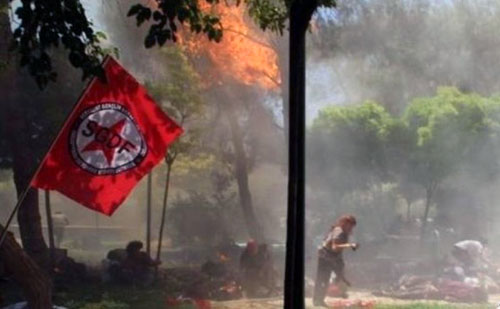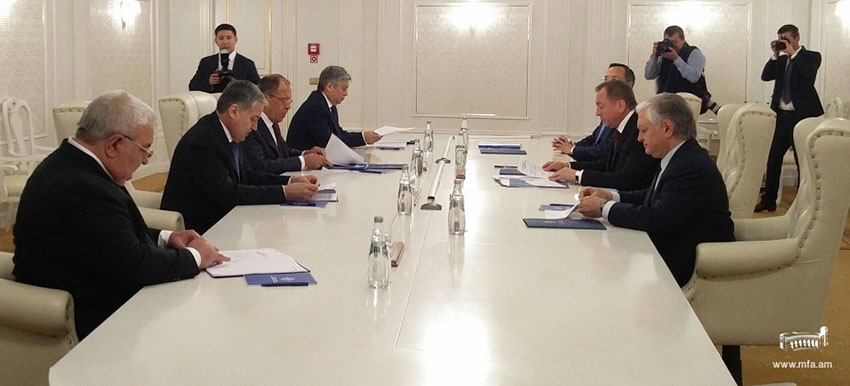On May 12 and the following days, the Azerbaijani armed forces penetrated the territory of the Republic of Armenia in three directions. It was officially confirmed that small enemy units advanced up to 3.5 kilometers in the Black Lake area of the Syunik region.
Days later, it was reported that talks between the local commanders were taking place and an agreement was reached to return the Azerbaijani troops to their original positions. However, the situation on the border has not changed significantly and according to the latest data, the Azerbaijanis continue to stay in three areas of border regions of Syunik, Vardenis, and Sisian.
Due to the situation on the border, there is an official large-scale diplomatic effort in Yerevan, in hopes of resolving the issue without armed conflict. The Armenian side is probably not ready for this at the moment, and such a development could serve as a pretext for Azerbaijani President Ilham Aliyev to implement his recent threats to secure a corridor through Zangezur to Nakhichevan.
Armenia first applied to the Collective Security Treaty Organization (CSTO), of which it was a founding member in 1992, alongside Kazakhstan, Kyrgyzstan, Russia, Tajikistan, and Uzbekistan. A year later, Belarus, Azerbaijan, and Georgia joined the treaty. Georgia and Azerbaijan, however, later exited from the organization, as well as Uzbekistan. The remaining nations in CSTO are Armenia, Russia, Belarus, Tajikistan, Kazakhstan, and Kyrgyzstan. According to the CSTO Charter, if the territorial integrity, sovereignty, security, and stability of any of the member states are threatened, the other member states are obliged to assist the applicant country. Naturally, it was logical that Armenia should first turn to that military alliance. So far, the CSTO leadership has contented itself with announcing that consultations have begun among member states on the matter.
French President Emmanuel Macron expressed a clearer position on the border incident, not only demanding the withdrawal of foreign troops from Armenian territories, but also, during a telephone conversation with Prime Minister Pashinyan,
expressed willingness to provide military assistance to Armenia in the event of UN consent.
The United States has also expressed concern about recent developments. Unlike the previous US administration, the White House is in active talks with Baku and Yerevan to resolve the issue through peaceful means and within the framework of Armenia’s territorial integrity.
As for Russia, its public statements were not satisfactory to the broad segments of citizens in Armenia, who expect more from its strategic ally, which has military bases in Armenia. Moscow, through its various spokespersons, expressed its eagerness to mediate on demarcation and other issues related to the border between Armenia and Azerbaijan, without expressing a clear position, or demanding the withdrawal of foreign troops from the territory of Armenia.
This posture naturally causes dissatisfaction among many inside Armenia, while others are demanding to look in other directions, i.e the West, to guarantee the country’s security and to protect its borders. Some, however, argue that Russia, being a sponsor of the November 9 agreement to end the 44-day war, should at least publicly show neutrality between the two sides.
In light of these developments, it was noteworthy that the Armenian Ministry of Defense issued a rather harsh statement on May 18, where there was a clearly stated warning to Azerbaijan. “In the absence of a peaceful settlement within a reasonable period, that is, in case the Azerbaijani servicemen do not return to their starting positions without preconditions, the RA Armed Forces reserve the right to resolve the issue by other means, including by force.” It is difficult to know what prompted the hardening of the Armenian position, but one can speculate that some external signs may have played a role, including from Russia.
According to the latest information provided by the Defense Ministry, some of the Azeri servicemen have returned to their original positions, without giving any additional details.
“MASSIS”











6 comments
It’s all very simple:
(1) Putin was angry against Pashinyan even before Pashinyan was elected in 2018. That is why, in effect, Putin conducted his war in 2020 against Armenia and Artsakh. Putin can’t control his temper and does things that even hurt Russia.
(2) Putin and Lavrov are now doing nothing about the Azeri intrusions into Armenia because they want to weaken Pashinyan before the June elections.
(3) Armenia is an ally to Russia, but Russia is not an ally to Armenia. Armenians have always known that Russia is not reliable, which is why Armenian leaders have always tried to maintain good relations with the West.
(4) Stalin betrayed Armenia in 1920 by giving Artsakh, Nakhichevan, and Western Armenia to Azerbaijan and Turkey. A similar thing is happening now.
This should not be difficult to understand.
You are absolutely right on your analysis
Armenia should learn once and for all that they have to stand and confront themselves all their challenges. In the same fashion as Armenia has its own interests, Russia and all its neighbors including Turkey have their own too. It’s time for Armenian to learn diplomacy and begin solving their problems themselves instead of crying to others for help.
Ana, I do find it difficult to understand why Stalin demarcated NK which was always Armenian populated, as part of what is now called Azerbaijan. I also feel that Pashinyan is a little bit secretive and inconsistent.
Armenia is, was and has been betrayed by all the thieves and traitors prior Pashinyan. The built their own castles all around Europe and filled their Swiss bank accounts. Instead keeping, amongst others, the RA army at strength. Pashinyan inherited the NK issue. Azerbaijan was provoked by Erdogan and Putin to start this war. Pashinyan meanwhile could only try not to swallow that poised pill called NK. Then and only then Putin had him swallow that pill, Russia ‘brokered’ the ceasefire. Pashinyan is ‘killed’ and therefor no longer in the position to lead Armenia. Not now, not after the election. What is the alternative ass kissing puppets to Putin. Where traitor Lavrov and Putin creating million dollar deals whit Az. Suggesting Az to return to CTSO, how much more proof do the Armenian people need, you are just screwed by Russia, Az is only and only Putin’s tool. Why are you putting your hopes that Russia will rule in Armenian’s favour. Pashinyan please send that text message to Macron. He offered for the 2nd time his help, all you need to ask him, please come and help us. Russia is your dead end street. Real dead end, it will be the end of the RA for ever. Putin will finish what Ataturk started, Stalin continued, whip out Armenia.
Response to Martin- That is what I said all along. Armenia cannot trust Putin’s Russia. What Armenia is waiting for is beyond my comprehension. She is being offered help by France with a big, well to do Armenian population. What is the problem. No other country has made such an offer so far. If an offer is not welcomed, will there ne another one. Take The Offer please and others will follow. Armenia needs real politicians that can make decisive decisions. Time is of the essence here.